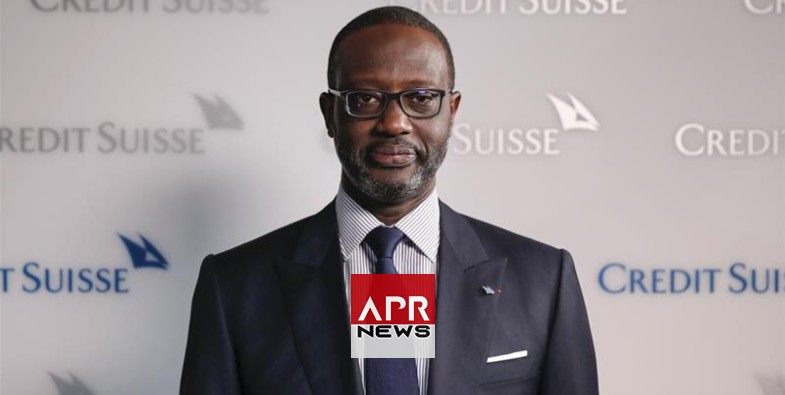You are here
Back to topAPRNEWS : Tidjane Thiam reacts to the Credit Suisse affair

APRNEWS : Tidjane Thiam reacts to the Credit Suisse affair
APRNEWS - Late on Sunday afternoon, UBS, under pressure from the Swiss authorities, finally agreed to buy its rival Crédit Suisse for 3 billion Swiss francs. After the initial shock of the derisory emergency takeover of Crédit Suisse, a bank that was apparently worth much more, the time has come to ask questions about the future of the new entity. How will the two banking giants integrate? What will happen to Crédit Suisse's corporate and investment banking (CIB) division, the source of the problems that brought it down? What will happen to its employees? More broadly, what will be the fate of European banks? These are just some of the questions raised by Tidjane Thiam, former head of Crédit Suisse. The Ivorian banker says he is very saddened...
"Like everyone else, I have watched the events unfolding in Zurich over the last few days with something akin to stunned disbelief. When I left my position as CEO of Credit Suisse, the bank had just reported its highest profits for 10 years after an in-depth restructuring. And although I effectively managed the delicate situations that developed under my leadership, things went wrong in the years that followed. Just over three years later, this same bank, which has been part of the Swiss national fabric for over 160 years, was pushed into the arms of its biggest rival, UBS, over a tumultuous weekend. Sadly, there will be a human impact on the thousands of people, and many former colleagues, who stand to lose their jobs as a result of this rescue.
Since leaving the bank in February 2020, I have mainly refrained from commenting on Credit Suisse, but the turn of events now compels me to speak out. A large part of my job as CEO - supported by a dedicated team - has been to chart a new course towards wealth management and away from investment banking in order to realise the full potential of the franchise. But an equally important task was to strengthen the balance sheet, which was at the bottom of the list of systemically important banks when I joined. So we raised CHF 10 billion in equity, resolved multi-billion legacy issues from the US mortgage-backed securities market to Mozambique, reduced risk exposure by 45% and eliminated more than CHF 100 billion of impaired assets.
Risk has always been a priority for me. It was clear that the bank's risk systems required major investment and that this would be a large-scale, multi-year undertaking. I often described it as a job that would take 10 years, which was clearly not complete by the time I left. Within days of taking office, one of my first decisions was to approve $150 million of new investment in risk management systems. We also increased compliance staff by more than 40%, at the same time as we carried out a major cost-cutting programme across the bank. I made it clear that until risk management and compliance systems were significantly improved, behaviour and culture would be more important than ever.
After the initial high-profile losses in late 2015 in downgraded receivables, I wound down that business, reduced our appetite for risk and made sure everyone understood that I was prepared to hear bad news when it happened. We managed to get through 16 quarters without serious problems, we had over USD 200 billion of flows in wealth management, reduce risk and reduce operating and legacy costs. In 2019, Credit Suisse made almost as much profit as its new owner UBS. Its current fate saddens me. But we need to focus on what is happening now. UBS has said it will keep the 'Jewel in the Crown' of Credit Suisse, the stand-alone Swiss bank I created that has always performed well despite the group's problems. However, regulators should consider whether they should allow a single national player of this size in the Swiss market. Arguably, UBS's attempt to absorb Credit Suisse's Swiss universal bank would do nothing more than add thousands of job losses to those already expected in investment banking.
From a broader perspective, policymakers need to strengthen investor confidence in the European banking sector. The treatment of Additional Tier 1 (AT1) bondholders has created significant uncertainty. What happened will play out in the courts for years to come. There is a basic principle that common equity is the first to be affected. It seems that the treatment of an AT1 - even if correct under current Swiss regulations - will increase the cost of capital for Swiss banks and for European banks. Some of their American peers will be rubbing their hands. AT1s or 'cocos' (contingent convertible bonds) are an important source of capital for European banks and because of market appetite, interest rates may not have fully reflected the risks involved.
This new layer of uncertainty will have a negative impact on the competitiveness of the European banking sector. On the net, American and Asian rivals could emerge from all this relatively stronger. A related issue is that shareholders were denied a vote on changes to the emergency legislation, which shocked many investors and market participants. Of course, it was an emergency. The alternative could have been much worse. But after the thousands of hours spent working on things like resolution plans since 2008, this episode shows the need for further work to codify approaches to banking crises and to be more transparent with investors about the likely response of decision-makers. We need to learn the lessons of the last few days - otherwise Credit Suisse will have fallen in vain".
By Jean Clotaire Tétiali







